For many of us, the Mahãbhãrata has been part of our childhood where our grandparents narrated interesting stories from this famous epic. But the power of the Mahãbhãrata is such that it is an epic that can be revisited a thousands of times over the course of our lives. Every time we read it, we discover new aspects and take new meanings from this epic that us filled with diverse characters, emotions and lessons for life. Now, an illustrated edition Panchali: The Game of Dice (Penguin India), written by Sibaji Bandyopadhyay and illustrated by Sankha Banerjee, gives us new insights into how the gambling episode contributed to the war in Mahãbhãrata. In this chat with The Sunday Guardian, Sankha Banerjee talks about this book and tells us what is next for them.
TSG: What was the inspiration behind this illustrated edition?
Sankha Banerjee [SB]: The everlasting contemporaneity is one of the strangest aspects of the Mahãbhãrata. A storehouse of stories, the epic provides endless interpretative routes for them. I have overgrown with it for more than a decade. Anything huge like the Himalayan forest or humble like a fallen leaf has been an inspiration. A news related to an anonymous girl child could be an inspiration. It’s difficult to express. This challenging openness of the stories has been the source of inspiration behind the graphic novel adaptation of the massive text for the story-writer Sibaji Bandyopadhyay and me as the illustrator.
TSG: Why did you choose this particular game of dice and Draupadi?
SB: Penguin India asked us to join hands in turning out a series of graphic novels based on the Mahãbhãrata. Panchali: The Game of Dice is the second part of the project, the previous one being Vyasa: The Beginning.
The book, Panchali; The Game of Dice has selected stories from Mahabharata from Laksha Griha to the end of the dice-game. Incidentally, many hold that the Game of Dice and the humiliation of Panchali/Draupadi following it constitute the two central happenings that led to the over-all devastation in the land of Bharata.
TSG: What were the challenges you face to make this book?
SB: Well, for the sake of economy, the writer had to perforce scale down the massive text, but, he did so without impairing its integrity. And, to mix and match the words, I had to experiment with thousands of visuals for this book, all hand painted. It requires a different kind of mental preparation and state of mind. I often lock myself in a room for weeks. A nerve-wrecking experience indeed for both of us.
TSG: Amar Chitra Katha for instance is known for its illustrated renditions. How different did you want to make this?
SB: Amar Chitra Katha did a great job. I have grown up with ACK but we should not compare us with them in any situation. Panchali: The Game of Dice does not bear any resemblance with the ‘Amar Chitra Katha’s take on the Mahãbhãrata. Firstly, our graphic novels do not shy away from depicting incidents generally viewed by adults as ‘adults only’—omitting them would have robbed the epic of its grandeur. Secondly, while the dialogues are made-up by the author, the events that are presented in the two books are solidly anchored to the most reliable version of the ‘manuscript tradition’ of the Sanskrit epic, i.e., the Critical Edition of the Mahãbhãrata brought out by Poona’s Bhandarkar Oriental Research Institute. TSG: Many Indian authors today are retelling mythological stories with their own take on them.
SB: India has a long tradition of storytelling. We love to hear and read mythological stories. If not all, at least a substantial amount of mythos circulating in India are amenable to multiple reading. By the same dint, they are also liable to over-simplification and ideological misappropriation. Shunning loudness, our effort has been to combat such motivated distortions of the Mahãbhãrata without compromising our right to poetic liberty.
TSG: What is next for you?
SB: Panchali has come, may be a book on Arjuna will come. We are working on that or may be some selective stories from Mahabharata! You never know.
Mahabharata: Panchali’s story brought to life visually
- Advertisement -

